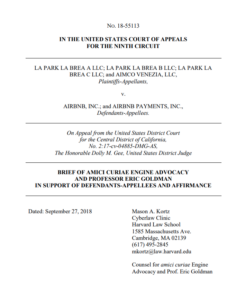 The Cyberlaw Clinic recently filed an amicus brief (pdf) in the United States Court of Appeals for the Ninth Circuit, on behalf of Engine Advocacy, a non-profit organization that advocates on behalf of the startup community, and Santa Clara University School of Law Professor Eric Goldman. The case involved a dispute between Airbnb, Inc. and a residential leasing company, Aimco, Inc., about the proper application of 47 U.S.C. § 230, a section of the Communications Decency Act that immunizes platforms against liability arising out of third-party speech.
The Cyberlaw Clinic recently filed an amicus brief (pdf) in the United States Court of Appeals for the Ninth Circuit, on behalf of Engine Advocacy, a non-profit organization that advocates on behalf of the startup community, and Santa Clara University School of Law Professor Eric Goldman. The case involved a dispute between Airbnb, Inc. and a residential leasing company, Aimco, Inc., about the proper application of 47 U.S.C. § 230, a section of the Communications Decency Act that immunizes platforms against liability arising out of third-party speech.
Aimco, in seeking to hold Airbnb liable, advances two theories that threaten to undermine the protections of Section 230: that Airbnb is liable for providing “brokerage services” that support the creation and use of third-party content, and that Airbnb itself generates content that contributes to the unlawful offers posted on the platform. The amicus brief argues that both theories of liability attempt to short-circuit the protections of Section 230. The brief further argues that a narrow reading of Section 230 would have negative consequences for the startup ecosystem. Aimco’s interpretation of Section 230 would instead work to the advantage of large platforms that are much more capable of absorbing large amounts of risk. This would result in less competition and less innovation online, which would be detrimental not only to platform operators but also to Internet users, as well as contrary to one of the primary purposes of Section 230. The brief concludes by asking the court to affirm the District Court’s proper application of Section 230.
Fall 2018 Cyberlaw Clinic students Sally Kagay, Maia Levy Daniel, and Saranna Soroka wrote this amicus brief with assistance from Clinical Instructor Mason Kortz. The Clinic team worked closely with Evan Engstrom of Engine and Professor Goldman to develop the arguments in the brief.
